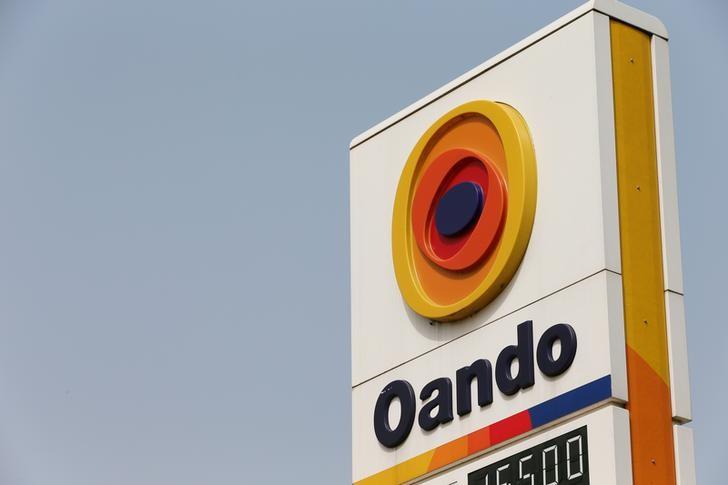Money and Fixed Income
How Oando Beats Odds to Surmounts N140.7Bn Loss
Published
3 years agoon

By Rosemary Iwuala
- As It Posts N34.7Bn Profit After Tax in 2021
Pulling out of the red zone of N140.7 billion losses in the previous year, Oando Plc has announced a N34.7 billion profit-after-tax in its 2021 financial year.
Read Also:
The indigenous company had endured a four-year-long battle with indirect shareholders of the company and the Nigerian Securities and Exchange Commission (SEC) which with other factors triggered the losses in 2020.
In its full year ended December 31, 2021, the Nigeria’s leading indigenous energy solutions provider in the period under review saw its revenues directly impacted by an unprecedented increase in militant attacks and sabotage.
However, despite the prevailing challenges at the time, Oando was still able to record a 51 per cent increase in turnover to N722.5 billion in 2021 compared to N477.1 billion in 2020 and a profit-after-tax of N34.7 billion in 2021 compared to a loss-after-tax of N140.7 billion in FYE 2020.
Commenting on the 2021 results Wale Tinubu, Group Chief Executive, Oando Plc said 2021 was defined by contrasting themes for Nigerian oil producers, with buoyant oil prices tempered by an increasingly challenging local operating environment.
According to him, bullish oil prices throughout the year saw the energy giant record a 105 per cent increase in average realised oil sale price whilst a surge in militancy and sabotage across the Niger Delta resulted in a 40 per cent decline in average hydrocarbon production compared to 2020.
“Despite the challenges, strong revenue performance and the refund of a long-standing receivable contributed to a Net Profit of N34.7 billion,” he said.
Despite the recorded profits, Oando’s average daily production declined by 40% to 26,775 boe/day in 2021, compared to 44,550 boe/day in 2020.
Drilling down further, in 2021, the company’s production consisted of 8,849 bbls/day of crude oil, 1,699 boe/day of NGLs and 97,363 mcf/day (16,227 boe/day) of natural gas.
The 40% decline was as a result of shut-ins for repairs and maintenance as well as sabotage incidences at its facilities.
Nigeria’s oil output fell by 13 per cent to 1.31 million barrels per day in December 2021 fueled by pipeline vandalism, oil theft and illegal refining currently occurring at an alarming rate in the Niger Delta.
According to the Nigerian Upstream Petroleum Regulatory Commission (NUPRC), the country lost about $3.27 billion worth of crude oil to theft between January 2021 and February 2022. As a result, the energy sector witnessed significant Force Majerus across oil companies operating in the region, ultimately impacting their bottom line.
Oando’s revenue for the period was positively impacted by high product prices, with realized average crude oil price increasing by 105 per cent ($70.12 per barrel compared to $34.21 per barrel in 2020), natural gas by 40 per cent ($9.96/boe compared to $7.13/boe in 2020), and NGL by 27 per cent ($6.98/boe compared to $5.48/boe in 2020).
These, in addition to an 8% increase in traded crude oil volumes (17,445,256 bbls compared to 16,081,633 bbls in 2020), and a 39% increase in traded refined products (962,370 MT compared to 694,653 MT in 2020) contributed to an overall increase in revenue of 51 per cent (N722.5 billion compared to N477.1 billion in the same period in 2020).
Speaking to the company’s future outlook, Adewale Tinubu said; ‘’As we continue to drive the growth of our existing businesses, whilst also exploring creative solutions towards curbing the incessant pipeline sabotage incidences that continue to plague our local industry, we are also committed to investing in climate-friendly and bankable energy solutions via Oando Clean Energy Limited, thus expanding our portfolio from Oil and Gas to include non-fossil energy solutions.
“We will continue to update our esteemed shareholders as progressive developments are made in the coming year,” he concluded.
Share this:
- Click to share on X (Opens in new window) X
- Click to share on Facebook (Opens in new window) Facebook
- Click to share on WhatsApp (Opens in new window) WhatsApp
- Click to share on Pocket (Opens in new window) Pocket
- Click to share on Telegram (Opens in new window) Telegram
- Click to email a link to a friend (Opens in new window) Email
- Click to share on LinkedIn (Opens in new window) LinkedIn
You may like


FG, SEC, NGX Group Forge Unified Direction on Capital Gains Tax Reform


Nigerian Authority Declares War on Influencers, Bloggers Promoting Fake Investment Schemes


Wema Bank Crosses N200bn Regulatory Capital Mark Ahead of 2026 Deadline


NGX Group, SEC Pursue Capital Market Diplomacy to Deepen Nigeria-China Financial Ties


Nigerian Listed Companies Paid N1.1Trn Dividends in 2024 – SEC


N1.3tn Loss to CBEX: SEC, EFCC to Punish Influencers, Celebrities Promoting Fraudulent Investments












